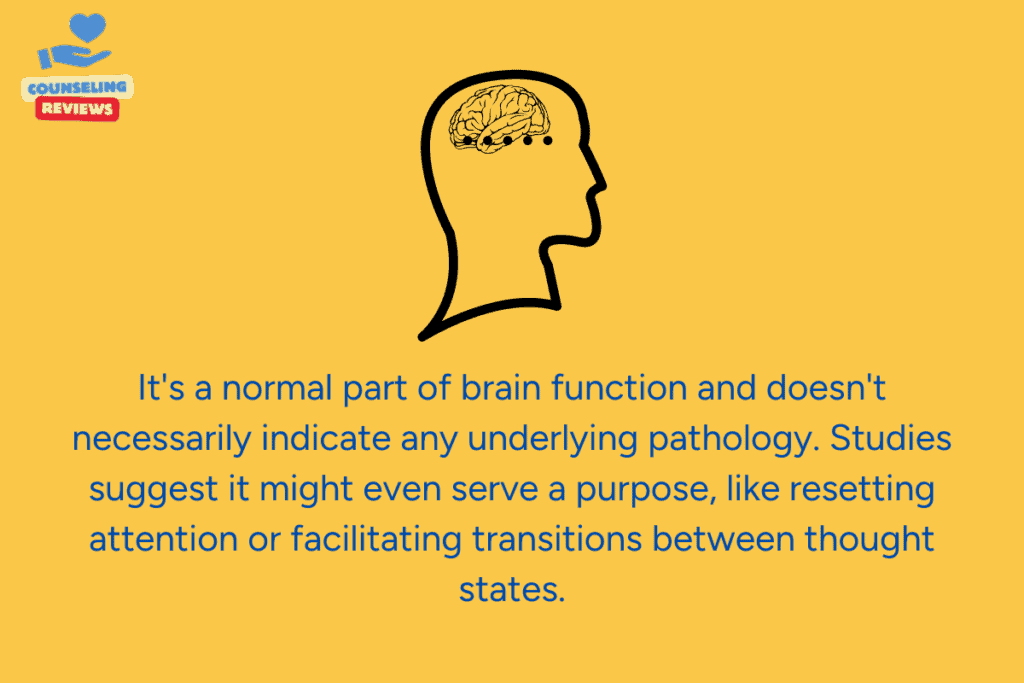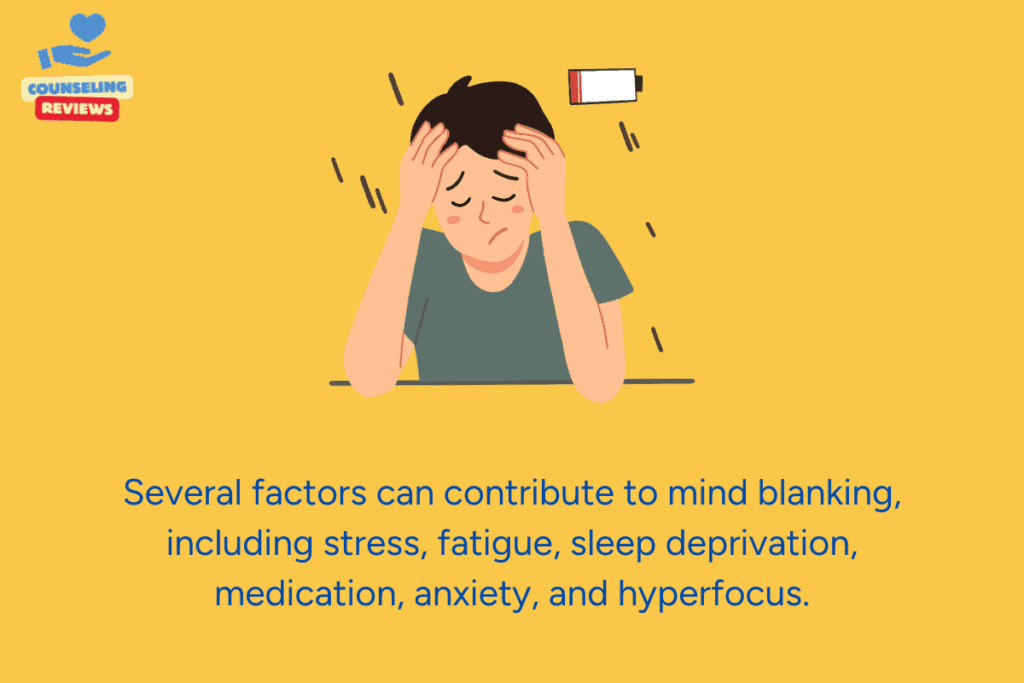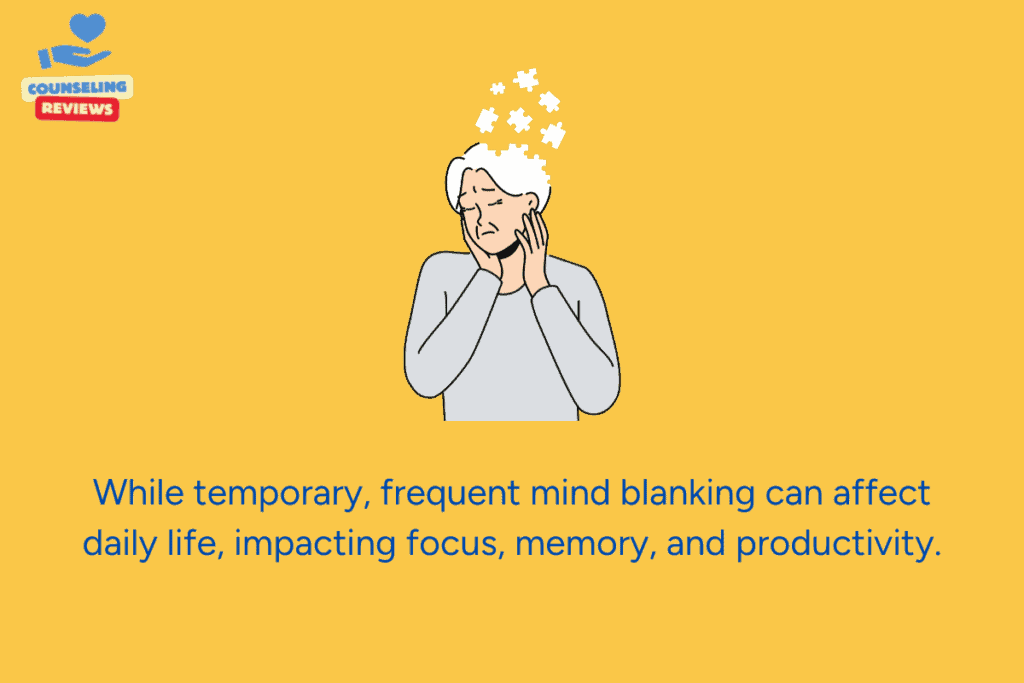There have been a lot of people asking us about what a blank mind syndrome is. A lot of mental health professionals end up explaining to their clients that such a thing doesn’t exist, at least according to the DSM 5. If it doesn’t, then why do people feel they have a blank mind syndrome?
When people say they experience a “blank mind,” they really mean that they do not think or feel the way they usually do. They may feel numb, struggle to think thoughts, or solve problems as usual. Thankfully, blank mind syndrome is not real, at least according to the diagnostic manuals. However, you may feel blank or numb at times, which may be due to several reasons.
In this article, we closely examine what people often associate a “blank mind syndrome” with and how one can deal with it.
What Is a Blank Mind Syndrome?
To be honest, there is no such thing as “Blank Mind Syndrome.” People often come up with terms that seem like a diagnosis but don’t exist. When people refer to a blank state of mind, it could be due to several reasons. For instance, people who are depressed often experience “poverty of thought.” “Poverty of thought” or a drastic reduction in the volume of thoughts can be a result of depression, borderline personality disorder, or even just plain boredom.

It is important to remember that just because you are unable to think or feel does not mean you have an actual psychological disorder. People often experience a blank state of mind when they are tired, stressed, or bored. In more severe cases, it could be a sign of depression, anxiety, trauma, or psychosis.
Nevertheless, “Blank Mind Syndrome” is not a diagnosis and is only a feature of pre-existing mental or physical conditions.
Common Causes of Blank Mind
Now that we know that Blank Mind Syndrome is not a real diagnosis, let us look at what causes symptoms that might lead you to believe you have it.

Depression
Depression is a mood disorder that often causes feelings of sadness, low self-esteem, and a feeling of helplessness. People experiencing depression also feel numb and find it difficult to solve problems. Problem-solving is an important cognitive function, and being unable to perform it may make you feel numb or that your mind is blank. In other words, if you are feeling blank, it might be a symptom of being depressed or experiencing another mood disorder.
Personality Disorders
People who have been diagnosed with personality disorders often experience a sense of depersonalization. This is especially true of people with borderline personality disorder (BPD). Depersonalization and dissociation can often feel like having a blank mind. You may think that you are observing yourself from a different perspective or may feel disconnected from your body. Other personality disorders that may cause you to feel numb or blank include schizoid personality disorder.
Trauma
People who have experienced trauma related to sexual abuse, war, or natural disasters are often diagnosed with post-traumatic stress disorder (PTSD). PTSD may make you feel like you are unable to connect with reality or your surroundings, and you may have flashbacks of your traumatic experiences. In addition, you may also feel numb and blank and unable to deal with your realities.
Attention Deficit Disorder
Both adults and youngsters with ADHD may experience what might be described as a blank state of mind. As they cannot concentrate or focus on things, they may experience a state of mind that resembles blankness. This often happens when they are over-stimulated or unable to deal with things. When people with ADHD feel overwhelmed by their environment, they may experience feelings of blankness.

Other physical and mental conditions
Feeling blank or numb is associated with several physical and mental conditions. If you’re feeling blank, it might be a sign of fatigue, tiredness, or lack of energy. You may also feel blank when you have not slept enough or had enough rest. Other reasons include injuries, brain disorders, dementia, and fatigue. Certain mental conditions like boredom, lack of motivation, and disinterest can also make you feel like you have a blank state of mind.
In short, blank mind syndrome is only a symptom. In other words, you may feel that your mind is blank due to a number of physical and mental conditions. Regardless of what the cause or reason is, there is always something you can do about it.
Coping Strategies for Dealing with Blank Mind
If you feel you have a blank mind, it could be due to a number of reasons. In most cases, you may be experiencing stress, fatigue, or a physical condition that your doctor can resolve. In other cases, it could be due to a psychological, psychiatric, or neurological condition. Here are the best ways to deal with a blank state of mind:
Rule out physical illnesses
As discussed previously, several physical conditions can cause a blank state of mind. Starting from malnutrition and fatigue to serious conditions like brain injuries and dementia, a blank state of mind is a symptom of many physical conditions. The first step is to make an appointment with your general physician (GP) and rule out physical conditions contributing to your blank state of mind. If your GP is not able to diagnose, he or she may make a referral to a specialist.
Make changes to your lifestyle
If the general physician (GP) or the specialist cannot pinpoint a physical reason for your blank state of mind, you may also try changing your lifestyle. This includes getting enough physical activity, maintaining sleep hygiene, and ensuring that you have enough social support. Most people tend to ignore the importance of social support and being around friends, family, and loved ones. Even spending time with your pets can help you eliminate the brain fog often associated with a blank state of mind.
Seek mental health evaluation
If physical evaluation and lifestyle changes do not help you regain your clarity of mind, you might want to seek the help of a registered mental health practitioner. As mentioned previously, depression, personality disorder, psychosis, and several psychological and psychiatric conditions can cause a blank state of mind. An accredited mental health professional will be able to pinpoint what’s happening and explain if your blank state of mind can be attributed to a mental condition if it is not due to a lifestyle or physical condition.
Mindfulness and Cognitive Techniques
In addition to traditional psychological treatments such as behavior therapy and relaxation exercises, you can also try mindfulness and cognitive techniques. Mindfulness meditation is known to help overwrought people reduce their stress levels so that they feel calmer and more relaxed.
Similarly, one can also try using cognitive techniques to address automatic negative thoughts so that symptoms of anxiety and depression are eased. This invariably helps you to feel energized and shake yourself up from a state of blank-mindedness.
You can always contact a psychologist or a mental health professional to learn mindfulness techniques and cognitive behavioral strategies to overcome blank-mindedness.
Professional Interventions for Blank Mind Syndrome
As discussed previously, if you are feeling blank or numb, your first stop should be at your nearest general physician (GP). Diabetes, malnutrition, hormonal imbalances, etc., can all cause you to feel blank and numb. Once physical conditions have been ruled out, your next step should be to make lifestyle changes. This includes getting enough sleep, eating well, exercising regularly, and engaging in self-soothing activities.
If neither medical attention nor lifestyle changes help you get rid of your blank state of mind, you should seek the help of a registered mental health professional. He or she will help you to address underlying problems related to stress, mood disorders, personality disorders, and trauma, which can all cause a blank state of mind.
At the end of the day, it is essential to remember that an empty state of mind is not a psychiatric or psychological diagnosis. Instead, it is a symptom of other conditions that warrant the attention of your general physician, mental health professional, and other associated health care providers.





